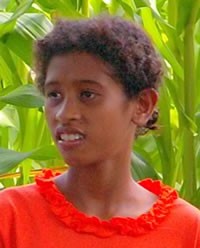The Termanu, also known as the people of the Termanu domain, are a sub-ethnic group within the broader Rotenese ethnic cluster, an Austronesian people indigenous to the central region of Rote Island in East Nusa Tenggara Province, Indonesia, primarily inhabiting the fertile lowlands and coastal villages around Feopopi and Onatali in Rote Tengah Subdistrict, Rote Ndao Regency.
Their name "Termanu" designates one of Rote's eighteen traditional domains, historically a central principality symbolizing unity and ritual authority, with its dialect serving as a lingua franca among Rotenese speakers. Origins trace to ancient Austronesian migrations from the Timor region around the 13th century, where proto-Rotenese clans settled the arid savannas and lontar palm groves, establishing semi-autonomous domains bound by kinship and oral covenants amid inter-island trade networks exchanging sandalwood, slaves, and textiles.
Pre-colonial society revolved around hierarchical domains under manek (rulers) who mediated spirit pacts and alliances against Timorese raids, with Termanu emerging as a pivotal realm due to its central location and fertile soils, fostering slash-and-burn rice terraces and irrigation systems that sustained a warrior-poet culture of epic recitations.
The 17th century marked Dutch VOC recognition of Termanu as one of twelve core domains between 1653 and 1662, integrating it into spice tribute systems while Portuguese influences lingered from Timor, introducing firearms that escalated domain rivalries. By the 19th century, colonial consolidation under Dutch rule eroded manek autonomy, imposing corvée labor and cash crops like coffee, yet preserved adat governance; missionary efforts from the 1800s accelerated Christianization, blending Protestant ethics with ancestral rites. Post-1949 independence, Termanu integrated into Indonesia's unitary state, contributing to regional development through education and migration to Kupang, while facing modernization pressures like erosion and tourism that challenge traditional lontar harvesting. Today, under the Amalo dynasty—exemplified by the 28th manek, Soleman Jeremias Miquel Amalo—the Termanu uphold linguistic prestige in their Central Malayo-Polynesian dialect, embodying Rote's legacy of resilient oral traditions amid globalization.
The Termanu lead a sun-baked rhythm in their thatched umah lobo (round houses) scattered across Rote's thorny acacia plains and palm-dotted coasts, where dry monsoons and ritual calendars orchestrate a blend of agrarian toil and poetic introspection, sustaining domain loyalties in East Nusa Tenggara's resilient heart.
Work centers on diversified subsistence, with families rotating communal labor to tend irrigated rice paddies, cornfields, and cassava plots on terraced slopes, while men harvest lontar palm sap for tuak fermentation and hunt wild pigs with spears, and women weave ikat textiles from local dyes or process peanuts and sorghum for market barter in Ba'a or Kupang; many commute seasonally to Timor for wage labor in fisheries or construction, merging ancestral self-reliance with remittances that fund domain festivals. Family dynamics follow patrilineal clans under manek oversight, with extended households in clustered villages where elders recite dyadic epics to resolve disputes, marriages forge alliances through bridewealth of buffalo or sasando instruments, and church-blessed ceremonies evoking ancestral migrations, and child-rearing emphasizes collective apprenticeship—youth learning palm-tapping from uncles amid lullabies that instill values of hospitality and domain pride.
Celebrations infuse the arid calendar with vibrant renewal, prominently the Pasola mock battles in March, where mounted warriors hurl blunted spears in ritual combat symbolizing rain fertility, accompanied by sasando lute ensembles and caci whip dances; the annual Hus lontar harvest feast features communal tumpeng rice cones offered to ancestors, gong-orchestrated processions to sacred stones, and storytelling vigils recounting domain origins, while Christmas merges with adat toasts under ti'i langga hats.
Food embodies the island's austere bounty in shared, spiced simplicity, staples of jagung bubur (corn porridge laced with coconut milk and chili) paired with ikan bakar (grilled reef fish in turmeric sambal), roasted cassava leaves, and ritual dog adobo for vitality; lontar tuak flows during gatherings, with klappertaart coconut custards capping feasts from banana-leaf platters, all affirming kinship and the earth's measured grace.
Termanus predominantly embrace Protestant Christianity, a faith adopted through 19th-century Dutch missionary outreach that intertwined monotheistic salvation with their ancestral worldview, emphasizing communal gratitude, ethical stewardship, and divine blessings on harvests and voyages. This belief permeates domain life via vernacular hymns in Termanu dialect sung during church assemblies, prayer vigils invoking the creator Lamatuan as aligned with the biblical God, and pastoral guidance that reframes ritual pillars as symbols of covenant. Elders harmonize gospel narratives with oral epics, viewing lontar cycles as providential cycles, while chapels serve as hubs for moral counsel and aid, with echoes of pre-colonial harmony lingering in harvest thanksgivings.
Revitalization of the Termanu dialect through school curricula and digital recordings is essential to preserve its dyadic poetics against the dominance of Indonesian in education and media. Sustainable irrigation and soil conservation practices would protect rice terraces from drought and erosion, ensuring food security tied to cultural harvest rites. Vocational training in eco-tourism and textile cooperatives would empower women and youth, harmonizing traditional crafts with economic opportunities amid island migration.
Pray for enriched Bible access in Termanu dialect, sparking domain fellowships that disciple families and reclaim sasando hymns as worship vessels.
Pray for spiritual renewals that exalt Christ's provision.
Pray for inter-domain dialogues rooted in shared Protestant heritage, opening gospel bridges with Muslim neighbors.
Pray for resilient water management to sustain paddies and palms, yielding abundant harvests for communal larders.
Scripture Prayers for the Termanu, Rotti in Indonesia.
Wikipedia. "Rotenese people."
https://en.wikipedia.org/wiki/Rotenese_people
Encyclopedia.com. "Rotinese."
https://www.encyclopedia.com/humanities/encyclopedias-almanacs-transcripts-and-maps/rotinese
OAPEN Library. "Master Poets, Ritual Masters: The Art of Oral Composition Among the Rotenese."
https://library.oapen.org/bitstream/handle/20.500.12657/32436/610747.pdf
Wikipedia. "Rote Island."
https://en.wikipedia.org/wiki/Rote_Island
Rote Guide. "5 Reasons to Visit Rote Island, Indonesia."
https://roteguide.com/5-reasons-to-visit-rote-island-indonesia/
Wikipedia. "Termanu language."
https://en.wikipedia.org/wiki/Termanu_language
Kesultanan dan Kerajaan di Indonesia. "Termanu, kerajaan / P. Rote – prov. Nusa Tenggara Timur."
https://sultansinindonesieblog.wordpress.com/timor/rote-termanu/
OAPEN Library. "Ritual Voices of Revelation: The Origin Narratives of the Rotenese." https://library.oapen.org/bitstream/handle/20.500.12657/98937/book.pdf
| Profile Source: Joshua Project |










